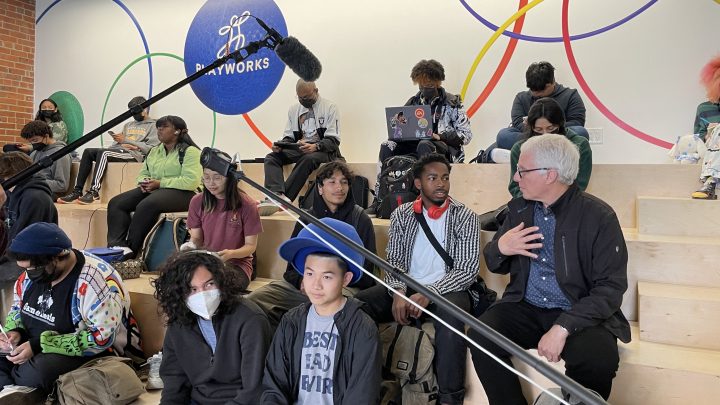
Tomorrow’s tech disruptors learn how to raise their game
Tomorrow’s tech disruptors learn how to raise their game

This is part three of “Skin in the Game,” a special project on “Marketplace Morning Report,” that looks at what video games, and the vast industry that surrounds them, can tell us about economics, business, money, careers and equity.
While the world is full of game players, where do we get more gamemakers?
In January, Adonis Renesca was a high schooler waiting for word on his college applications. By spring, Renesca had become a video game developer. His first game, “Bombastic African Beats”, is based off of music from Mali. You use letters on the keyboard to manipulate falling arrows into matching color boxes, almost like “Dance Dance Revolution.”
Renesca created this for a mentoring program in Oakland, California, called Gameheads. The non-profit holds classes in game development, coding, animation, and multimedia on Saturdays and more intensively in the summer.
Before finding the program, Renesca had never visualized a career in this burgeoning side of tech that dominates the economy where he lives. In one exercise, a Gameheads mentor asked students to pick from a pile of possible job titles.
“He just gave us a bunch of cards, and we had to try and describe it,” said Renesca. “And I think I got senior video game program manager. It’s like, you’re gonna have to learn, I guess.”
Gameheads was started by a teacher who one day, on impulse, told a group of slackers if they did their work he’d teach them to design video games. Surprise: They did their work. Then it was up to that teacher, Damon Packwood, to make good on his promise. The idea grew from there, with help from philanthropies like the California Endowment and, over time, contributions of money and stuff from nearby game companies including Electronic Arts, Unity and Riot Games.
“And we only do cool things and we only work with cool people and we only have cool equipment and cool hardware and cool software,” said Packwood.
Among the “cool people” are mentors who also work at game studios large and small just across the bay. Gameheads is about creating possibilities for mostly students of color who’ve been left thinking tech jobs were for someone else who doesn’t look like them.
The video game industry, as one graduate of Gameheads put it, is “lacking in melanin” and is now under moral and commercial pressure to change.
“We have a common concern, right?” said Packwood. “I want our students to be successful in whatever they decide that they want to do. We just so happen to use video games to do it. And you guys just happen to have a serious diversity problem.”

Gameheads has accumulated the technology for hands-on work, like pro software and motion capture suits. Renesca likes the donated Ferrari-style seating.
But the big asset here is the curriculum. Packwood sees the program as one big hack of traditional education.
“Tech is growing so fast that we really don’t know what skills to actually teach them,” he said. “Because in five years, 10 years, they might be obsolete. So like, what skills do they need in order to be prepared for the future?”
There are some universal skills, like: communication, collaboration, creativity, problem solving, learning how to learn and having an academic mindset.
Martha Martin is from a few towns north of Oakland. After doing logistics in the Air Force, she’s now in college. Martin’s game features little attackers trying to nibble away at the player. She made a status bar tracking emotional health.
“So that’s what my whole game about, it’s taking your identity and take it to your safe place as you go through your journey,” she said.
Martin is especially interested in animation. The stock images she found didn’t cut it.
“When I was researching, like, pixel art, there wasn’t many person of color ones, so I had to make my own,” she said.
That says a lot in itself about the industry.
As we spoke, Martin was applying to join a student group at Gameheads working on a game about love and relationships. As for Renesca, he starts at UCLA in the fall.
To tell us your own story about learning about money, business and economic from video games, email morningreport@marketplace.org. And you have to see our films about young people cracking into tech through Gameheads. Tell a young person near you they’re just a click away on YouTube.
There’s a lot happening in the world. Through it all, Marketplace is here for you.
You rely on Marketplace to break down the world’s events and tell you how it affects you in a fact-based, approachable way. We rely on your financial support to keep making that possible.
Your donation today powers the independent journalism that you rely on. For just $5/month, you can help sustain Marketplace so we can keep reporting on the things that matter to you.












